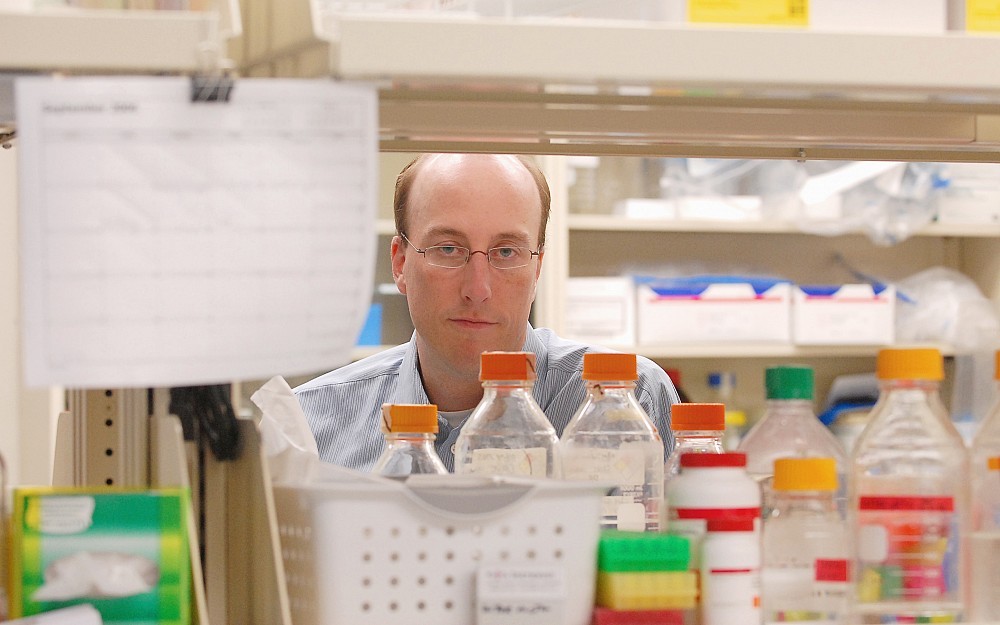
UC, Ethicon Endo-Surgery Partner in Fight Against Obesity
CINCINNATIUniversity of Cincinnati (UC) researchers are partnering with Cincinnati-based Ethicon Endo-Surgery to gain a better understanding of the basic biology behind obesity.
A three-year, multi-million dollar commitment from the medical device company will support UC researchers and Ethicon Endo-Surgery engineers as they work to find new solutions for treating obesity and related conditions, including diabetes.
The main focus of the research partnership will be to gain insight into the hows and whys behind bariatric surgerysuch as the Roux-en-Y gastric bypass procedure.
Gastric bypass is one of the most effective treatments for obesity, says Randy Seeley, PhD, professor and associate director of UCs Obesity Research Center at the universitys Genome Research Institute. But for a variety of reasons, its not the best option for everyone.
We want to determine why this and other procedures work so well and then develop new ways to replicate the same results so that more people have access to treatment.
During a Roux-en-Y bypass surgery, a small pouch is created near the top of the stomach and this new, smaller stomach is then connected directly to the small intestine.
While the surgery has been shown to be one of the most effective treatments for obesity, there is little known about why and how it actually works.
Gastric bypass is not purely mechanical, says Seeley. A smaller stomach does limit the number of calories a person consumes, but there are physiological events crucial to the dramatic weight loss that havent yet been explained.
For example, Seeley says, you would assume that someone who eats less would be hungrier.
Thats not the case, he adds. These patients arent as hungry, despite the fact that they are technically being deprived of calories. A key question becomes why dont they feel the drive to eat more to keep up like people who lose weight purely by dieting do?
Seeley says theres another key change in many gastric bypass patients thats been unexplainable: People with diabetes who have gastric bypass surgery often leave the hospital without the need for diabetes medications.
Seeley and a team of researchers will work with engineers from Ethicon Endo-Surgerya company dedicated to developing and marketing advanced medical devices for minimally invasive and open surgical proceduresto test existing theories for why Roux-en-Y is so effective and then work to develop new, validated engineering concepts that could be used as alternatives to this procedure.
As a company committed to transforming patient care through innovation, Ethicon Endo-Surgery is excited about the opportunity to partner with the University of Cincinnati to apply metabolic research to help enhance current medical interventions and develop new treatments for obesity and its co-morbid conditions, said Kevin Lobo, president, Ethicon Endo Surgery. This partnership is a strategic investment by Ethicon Endo-Surgery to help enable us to provide a full range of comprehensive solutions to treat obesity.
The Centers for Disease Control and Prevention estimates that more than one-third of all U.S. adults over age 20 are obese. The prevalence of obesity is rising in children.
Obesity is one of the largest unmet medical needs, says Seeley. Our team works every day to provide some understanding of the basic biology, but we need partners like Ethicon Endo-Surgery to take our ideas and put them into action for patients.
Growing its number of industry partnerships has become a focus for UC. In 2007, UC increased its industry-sponsored research support by nearly 40 percent.
Depleted research funding at the federal level has made industry-university partnerships more important than ever, says Sandra Degen, PhD, vice president for research. Not only do these partnerships provide financial support to the universitys research enterprise, but they also bring new jobs to the area and promote collaboration among scientists in a variety of fields.
And in this case, that collaboration could lead to healthier living and new knowledge about a serious disease.
In addition to working with Ethicon Endo-Surgery engineers on this project, Seeley will partner with UC Obesity Research Center colleagues David D'Alessio, MD, Stephen Benoit, PhD, Silvana Obici, MD, Darleen Sandoval, PhD, Matthias Tschöp, MD, and Stephen Woods, PhD.

Randy Seeley, PhD, director of the Cincinnati Diabetes and Obesity Center.

Obesity researcher Randy Seeley, PhD

Randy Seeley, PhD, was one of 29 scientists asked to present at the recently concluded 134th Nobel Symposium in Gothenburg, Sweden.

Obesity researcher Randy Seeley, PhD
Tags
Related Stories
Department of Urology established at UC College of Medicine
July 8, 2024
The Department of Urology became the College of Medicine’s 24th academic department on July 1.
UC study: Brain organ plays key role in adult neurogenesis
July 2, 2024
The University of Cincinnati has published research in the Proceedings of the National Academy of Sciences that found the choroid plexus and cerebrospinal fluid play a key role in maintaining a pool of newly born neurons to repair the adult brain after injury.
Put down that beer; it's not a tanning lotion
July 1, 2024
The University of Cincinnati's Kelly Dobos joined WVXU's Cincinnati Edition to discuss what's fact and what's myth when it comes to sunscreen use, different kinds of sunscreen and a social media recommendation to use beer on your skin to help get a tan.
